Sue Burke's Blog, page 77
December 25, 2012
2012 holiday newsletter
(If you’re on your Christmas card list, you’ve already received this.)

This sculpture of the Three Kings is on the side of a building in our neighborhood.
We've had a quiet year, even though political and economic events here in Spain and back in the United States were noisy and intrusive.
We joined my husband Jerry's brother Tom and his wife Mary for delightful and scenic long weekend in June. They were in San Sebastián-Donostia on the northern Atlantic coast of Spain as part of their European tour.
We also visited Milwaukee at the end of August and early September to see family and friends, and took a side trip to Chicago for the World Science Fiction Convention. I also attended Spain's 2012 science fiction convention near San Sebastián in October.
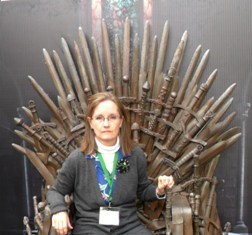
The Iron Throne made a special guest appearance at Spain’s convention.
For yet another year, my first novel debut has been moved back, now to fall of 2013, due to a weak economy. The book is tentatively titled Pax: a Novel. Stay tuned.
I’m still teaching English to Spanish teenagers, and has participated in several translation projects, including the ongoing translation of the Spanish medieval novel Amadis of Gaul. You can read it at http://amadisofgaul.blogspot.com.
Jerry is still working in IBM sales, and traveled this year to Munich, Belgrade, Milan, Dubai, Amsterdam, Geneva, and Brussels.
Best wishes for the holidays and for 2013!
— Sue Burke
December 22, 2012
El Gordo: Update
Good enough. I hope your holidays at least break even, too.
— Sue Burke
December 21, 2012
"The Giants of Galtares"
The story is based on an incidental character from Chapters 11 and 12 from the medieval novel Amadis of Gaul. A damsel accompanies a knight on a perilous mission...
http://weightlessbooks.com/genre/fiction/beneath-ceaseless-skies-issue-111/ in a variety of formats.
http://www.amazon.com/Beneath-Ceaseless-Skies-Issue-ebook/dp/B00AQN4GLU/ in Kindle format.
-- Sue Burke
December 19, 2012
My lucky number: 29168
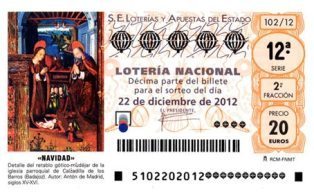
The real celebration of Christmas in Spain starts on Saturday, December 22, with the drawing of the El Gordo lottery. Lottery tickets cost €200 (about US$260), and are sold in one-tenth shares. Like many people, I bought my décimo share through work so that my coworkers and I can share the thrill of victory or the agony of defeat. If I believed in lotteries more, I could also buy tickets through places like my newspaper kiosk or my supermarket and share their luck, or buy tickets directly from a lottery shop.
Luck is what matters. Spaniards believe in luck.
Here in Madrid, the number 17912 sold out fast because on 17 September 2012, the politician who headed Madrid Province resigned. Love her or hate her (few people are neutral), her resignation made for a big day. Moreover, her first name is Esperanza or “Hope.”
At work, we sent the receptionist to the lottery shop around the corner to buy a number at random, which she did: 29168. Is 29 January 68 lucky? Nothing significant seems to have happened on that date in any year ending in 68. I don’t know if this is good or bad.
The El Gordo jackpot is huge, €2,500,000,000 (over US$3 billion), but it gets split into 15,304 prizes ranging from €400,000 (about US$.5 million) for a first-prize décimo to 20€. I’ve never won anything yet, and I’d be happy to merely get my money back. My chances of winning something are 15.3%, so I’m not very hopeful.
It will take three and a half hours on Saturday morning to draw the winners and announce the prizes. The lottery began in 1812, and the winning numbers and prizes are sung by students of San Idelfonso School of Madrid. Yes, sung. You can watch a segment of the 2011 drawing here:
http://www.rtve.es/alacarta/videos/loteria-de-navidad/especial-informativo-sorteo-loteria-navidad-2011-tercera-hora/1279229/
I think this year’s television advertisement is a creepy. There’s no real dialogue, so you can understand it (to the extent that it is understandable) without knowing Spanish:
http://youtu.be/QOqCsQ5cFzY
http://www.suenaconlaloteriadenavidad.es/web/el_anuncio.php
If you want to buy lottery tickets and you don’t live in Spain, they are for sale over the Internet. Most but not all of the vendors are legitimate. I can vouch for La Bruixa d’Or (the Golden Witch) in Sort, a town in Catalonia. In Spain, witches are lucky and the name of the town, Sort, means “luck” in Catalan:
http://www.labruixador.es/BruixaWeb/index.xhtml
— Sue Burke
December 12, 2012
Go Ahead — Write This Story: Edit yourself
The final version of your story or other work should be perfect. No typos, no errors. Tough to do, as I can testify. But a few simple techniques will help you catch a lot of mistakes.
First, set aside your piece for as long as you can so that you can return to it with detachment.
Second, print it out and edit it on paper, or if that’s not possible (or in addition), change the type font so that it looks different on the screen.
Finally, read it out loud (whispering is okay), which will help you catch missing words and other typos, and will help you hear things that aren’t quite working.
If you need something to write, here are a few ideas:
● This is a military SF story in which the efficacy of petitionary prayer is proven, and the work of military chaplains is changed forever.
● This is a suburban fantasy about a cute, just-hatched dragon that imprints on the first large creature it sees.
● This is a story about a teacher at an education mall who creates classes to lure in students with their cash vouchers without regard to the content of the lessons.
— Sue Burke
December 5, 2012
Destination Iraq
My friend Sean McLachlan went on vacation in Iraq. Seriously.
He writes for Gadling, a major travel blog, and got them to foot the bill. He only had to survive the trip:
“So I'm traveling in a war-torn region rife with sectarian violence under the care of a man I'd never met? Isn't that a bit stupid? Car bombs, Al Qaeda, people being beheaded on Youtube videos, hello!
“Yeah, yeah, I know. But there are 31 million people living in Iraq 365 days a year, so there's got to be a lot more happening there than that. That's what I signed up to see. I've been to so-called dangerous regions before – Palestine, Kurdistan, and Somaliland, to name a few – and every single one of them turned out to be less dangerous than TV wants us to believe. The media thrives on death. When the famine ended in Ethiopia, it dropped off the news. When the civil war ended in Colombia, it dropped off the news. And how often do you hear about Iraq when something isn't blowing up?”
So starts his 17-day vacation in Iraq, “in search of adventure, archaeology and AK-47s.” He saw amazing beauty, and visited the ziggurat of Babylon, the ancient city of Ur, and one of Saddam Hussein’s palaces. He went for a beer run in Basra.
Read his posts so far and enjoy the photos at:
http://www.gadling.com/tag/destinationiraq
— Sue Burke
November 28, 2012
What Broads can do

A long time ago, the realms of science fiction, fantasy, and horror endured a debate over whether women could write as well as men. For example, could a woman really write as well as James Tiptree Jr.?
It turned out that Tiptree was really Alice B. Sheldon. That almost ended debate then and there, except for occasional nonsense like this:
http://www.guardian.co.uk/books/booksblog/2009/sep/23/sexism-horror-novels-row
http://blogs.suntimes.com/foreignc/2012/11/post-2.html
Of course women can write, and here’s a chance to see what they can do. Broad Universe, an organization that promotes women in gender fiction, has published an anthology of twenty-nine short stories and fiction excerpts. Broad Spectrum, The 2012 Broad Universe Fiction Sampler even includes a story by me.
The anthology is free. Get the ebook here:
http://www.smashwords.com/books/view/249822
Available in multiple formats: online in HTML and JavaScript, or in Kindle, Epub, PDF, RTF, LRF, and Palm Doc PDB.
— Sue Burke
November 21, 2012
Go Ahead — Write This Story: The Turkey City Lexicon
Technically, the Turkey City Lexicon was created to help participants in writers’ workshops or critique groups to refer to common problems with a common vocabulary. But if you read the lexicon before you start writing, you might pick up a few clues about common problems you should avoid: Pushbutton Words, Dischisms, Signals from Fred, and the ever-popular Idiot Plot.
You can find the lexicon at the SFWA website: http://www.sfwa.org/2009/06/turkey-city-lexicon-a-primer-for-sf-workshops/
With your newfound wisdom, you can write a story that uses The Edges of Ideas or an Ontological Riff. If you need a story idea, here are a few:
• This is a race against time story in which an astronomer discovers that Earth's magnetic field has attracted a herd of ion-munching space grazers that in turn attract space predators.
• This is a sibling rivalry story about a quintet of clones who decide to use their identical appearances to pull off the perfect crime.
• This is a young adult fantasy novel about a kind but misguided tarot reader who uses marked cards to provide more "appropriate" readings.
— Sue Burke
November 14, 2012
Spanish SF conventions: almost the same
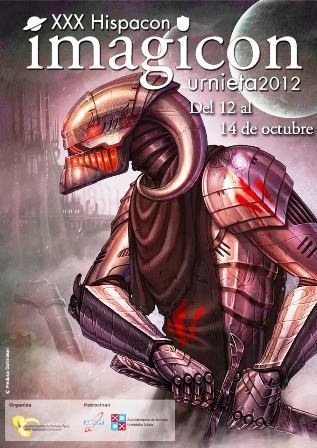
I’ve attended science fiction conventions in the US and in Spain, including this year’s Worldcon in Chicago at the end of summer and Hispacon in Urnieta in mid-October. In some ways, conventions in both countries are alike, which isn’t surprising. Although Spain has its own literary trajectory, many of the traditions and habits of American and British fandom have been imported into Spanish fandom, such as genre categories, awards, and the whole idea of conventions themselves.
In fact, Spanish fans (and fans in most of the rest of the world) will know all about Isaac Asimov or China Miéville, although US fans are unlikely to know about Domingo Santos or Javier Negrete — translations flow mostly one way, sadly.
At a Spanish convention, much like a US or British convention, you will find an active interest in books, magazines, television, movies, and Internet publications, activities, and entertainment. Costumes, including steampunk garb, are becoming more popular. Role playing games caught on a while ago. More and more often, convention attendees wear tee-shirts with genre slogans and art, but Hawaiian shirts have yet to make a splash.
Spanish authors and fans mix with the same equality as in the US or Britain, and for the same reason: authors are fans. You’ll find panels and workshops of authors and fans expounding on topics more or less related to the genre and happy to interact with the audience to the enrichment of all.
But you’ll find a few cultural differences that are very Spanish.
Kissing
Actually, this is a general Spanish thing. Friends greet and say goodbye with air kisses on both cheeks: men and women, women and women. Since Spaniards are in general good-looking, this is fun in itself. But imagine the squee of kissing your favorite author!
Book presentations
New books are presented to fans and likely readers in sessions at conventions (and at bookstores and events at other times of the year), although not quite the same way. In the US, the author might make a few remarks and then read from the new book. In Spain, a panel of people possibly including the author will expound on the book, and the book will be shown off with all its glorious cover art, but it won’t be read aloud. I don’t know why. It’s just not done — not frowned upon when done in other countries, but not done in Spain.
Awards
Unlike than in the US or Britain, awards are often presented for unpublished works. This is an old tradition especially common outside the genre, and, really, the award acts as publicity for the soon-to-be-published work. At a Hispacon, the big awards, like the Ignotus (which is the Spanish equivalent of the Hugo) are for published works, but you might encounter an award or two for something not yet in print. This is why.
Alcohol I
Somehow, every convention manages to have a bar on premises or at least nearby. A Spanish bar serves everything from liquor to coffee along with snacks, so you can be in the bar at any time from morning to night. You’ll probably be there sooner or later, even if you’re a tea-totaler.
Alcohol II
Spain has a wine-based cuisine. No dinner is complete without wine. So at a gala awards dinner, expect to get all the wine you can drink. In addition, or as a consequence, expect the dinner to be loud and jovial.
Alcohol III
Don’t expect room parties at the hotel. This just isn’t the custom. Spaniards rarely invite non-family members to their homes for entertainment, so to the extent that a hotel room is a home away from home, it’s not the place for entertaining people. Instead, friends meet in bars for a night out, both in daily life and at conventions. Since Spanish bars are so plentiful and varied, the lack of room parties creates no problem at conventions. You can go to bed early at a Worldcon or a Hispacon, but you don’t have to. Why would you even want to?
So a Hispacon will be different from a Worldcon, but just as at a Worldcon, you can have all the fun you can handle, learn about new books, discuss shows and films, make friends, and meet (and maybe kiss) your favorite authors. Best and most important of all, you can spend a weekend engaged in fierce public love of literature. Fans are like that the world over.
— Sue Burke
November 7, 2012
Election watch in Madrid
Time zones yawn wide. Florida is six hours behind Madrid, so the election night party in Madrid started when the party in Florida would have ended if Florida knew how to count votes — that is, a little before midnight on November 6, 2012.
Four years ago, Democrats Abroad Madrid, the local chapter of the overseas branch of the Democratic Party, had organized an election night party at the Circulo de Bellas Artes, a big, venerable cultural center. This year we went for Sala Galileo Galilei, an old theater recreated as a popular live music venue.
The 2008 election had generated extraordinary enthusiasm. In Spain, the vote had been simplified to one question: Would the United States, with its racist past, elect a black man as president? Americans and Spaniards wanted to witness history, so although we had hoped for 2,000 people at the party, more than twice that number wanted to attend. And the night had been magic.
Now, the stakes seemed less historic, although American passions ran high among both long-term residents and students who had come to study abroad. Economic troubles in Spain and the US meant that Spaniards were following the election with a more personal interest this time, since a strong US economy could help pull Spain from its recession. Romney tended to remind them of Merkel.
This year, we chose a more modest site for the party, which turned out to be ideal for a party of 500. At 11:30 p.m. a volunteer crew arrived for tasks like decorating and setting up food sales. I was helping with the media. We expected about 40 journalists, and some were already waiting for me, looking for people to interview and hoping they could circulate freely through the crowd. “Of course,” I said. “Make yourself at home and talk to anyone you want.” They did, to the entertainment of party-goers.
Journalists found plenty of local color in the people wearing campaign tee-shirts and hats. One man even wore an Obama campaign tie. A volunteer painted faces. I led a cameraman to one woman who had come with tiny flags painted on her nails, and she was happy to display them. Best of all, we had life-sized cardboard cutout of President Obama so we could pose for photos with it. One television reporter did her standup with her arm around its shoulders.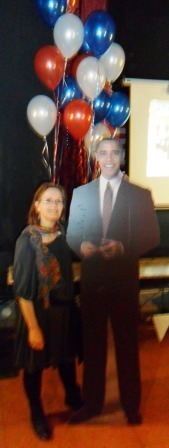
Mostly, we waited. And waited, watching CNN projected on a screen on the stage. At 1:10 a.m., Florida was reported to be leaning Obama, and we screamed even though the vote tallies were coming in slowly. An hour later, I was getting the Obama sunrise logo painted on my cheek, but we paused when singer Liza Tredway took the stage to lead us in the national anthem.
Then it was back to waiting, watching CNN’s dogged reporting, cheering or booing results and projections until we were hoarse, checking the Internet for news, sharing gossip and nervousness, buying a snack and a drink, and waiting...
At 4 a.m., the news looked very good, but too many states — especially Florida, whose count in key areas was far from certain — were still too close to call. At 5:15, we knew the final outcome was near. The cardboard Obama moved across the room to witness the results more closely.
Then, at 5:20, CNN called the election. We cheered, we hugged, we kissed. Cardboard Obama went bodysurfing through the crowd.
Only one thing remained: the victory speech. The crowd thinned. Someone had apparently kidnaped Cardboard Obama because it could not longer be found. But we kept waiting to see the final act of this long night.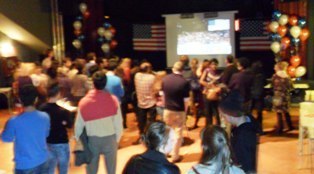
It didn’t come. Romney wouldn’t concede, even though Fox News had declared Obama the winner. Finally, the hall had to close. A friend and I shared a cab home in the cold, dark morning, and when I got to bed at 6:40, Romney still hadn’t conceded.
This had been a heated election, but Obama wasn’t as historic as he had been in 2008. Instead, he was a sitting president with a record of successes and disappointments seeking re-election. The magic had dissipated, but another process had begun that would be analyzed and overanalyzed for days and weeks to come. His victory would change America. I knew I could see his speech on the Internet when I woke up. And maybe Florida’s votes would have been counted, too. (No, they weren’t.)
— Sue Burke



